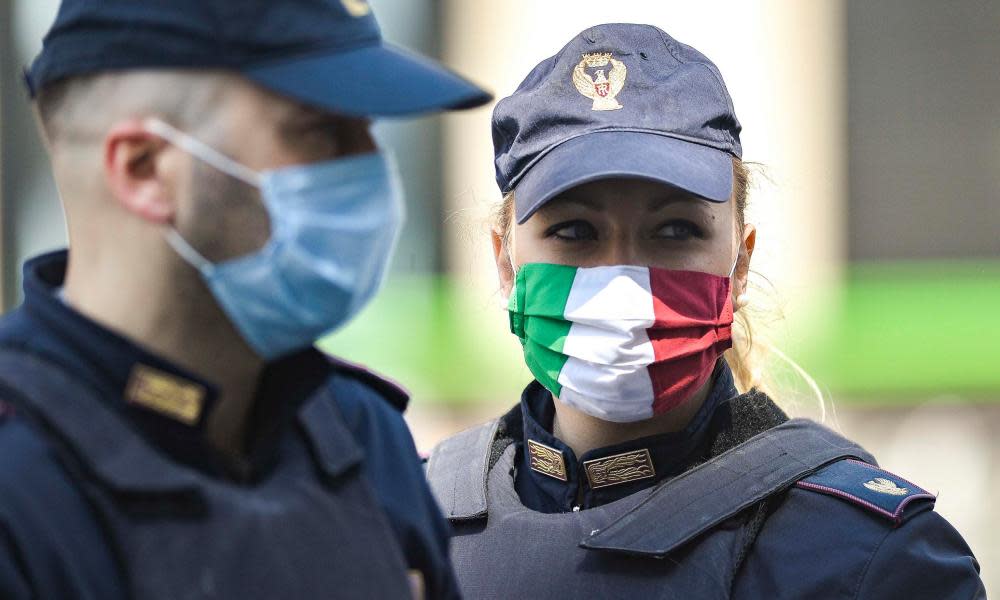Italians are looking on aghast at the UK's coronavirus response

CNN and the Sydney Morning Herald ask: “Where did it go wrong for the UK on coronavirus?” Reuters investigates why the UK left “its weakest exposed” in care homes. My own newspaper, La Repubblica, acknowledged the “grave errors” made in Italy, but observed that the “confusion and contradictions displayed by the British government in the past few months have few equals”.
The way the world is looking at the UK is not the way the UK is looking at itself. Despite becoming the worst-hit country in Europe, Boris Johnson is enjoying the peak of his popularity curve, according to a latest Edelman poll. Moreover, in the last couple of days, this record death toll has often been pushed out of the front pages by other splashes (the likely relaxation of the lockdown or Neil Ferguson’s resignation). Many Italians are wondering and asking me: “How is this possible?”
“A plague on both your houses!” yelled Mercutio in Romeo and Juliet. As the UK correspondent for an Italian daily newspaper, my two “houses” are Italy and the UK, the two European nations most badly afflicted by Covid-19. I am aware that we are all exhausted by this experience, habituated to the rising count of fatalities.
However, the reality remains stark. The silent majority of Italians, who constitute a sizeable community of about 700,000 people in the UK, are heartbroken that the British people are suffering the same fate as their home country. A small but loud minority of Italians on social media castigate the “reluctance” and “naivety” of Johnson and the British government when it came to containing the pandemic, despite having watched the Covid-19 hell unfold in Italy many weeks before. Some haven’t forgotten the remarks of a few eminent British commentators who, at the very beginning of the coronavirus crisis, hinted at some sort of “typical Italian” mismanagement.
Two events in particular in the UK truly shocked Italians. First, Johnson’s chilling warning in early March that many more British families would “lose loved ones”. For them, it was inconceivable that a leader would say this, as though the government had already given up in their effort to save lives.
Second, and even worse, were the remarks by the UK’s chief scientific adviser, Sir Patrick Vallance, suggesting that “herd immunity” might be desirable. Many in Italy reacted with a deep sense of outrage. It was as if the “sacrifice” they had made by being first in Europe to fall to the virus had been ignored; it had resulted in no lessons for the UK.
When a lockdown was eventually enforced in the UK, many Italians I spoke to couldn’t understand why we in Britain were allowed to jog, go for a walk or simply leave home without showing papers to the police: “You’re nuts, just stay home!” has been a fairly frequent reaction. Italy slightly relaxed its firm lockdown on 4 May. Police checkpoints were – actually still are – everywhere and thousands who breached the rules have been subjected to criminal charges. When Britain recently became the country with the worst coronavirus death toll in Europe, many Italians grieved in shock. To others it was only to be expected given the UK’s “softer” lockdown.
Since Johnson’s infamous “loved ones” conference, at least 30,000 Italians have left the UK to go back to their home country, according to an official at the Italian embassy in London. Based on my conversations with people, this trend seems to have peaked after the death of a “very healthy” 19-year-old Italian chef, Luca Di Nicola, from coronavirus in London. The initially soft Covid-19 approach of the UK government generated a great deal of fear among Italians, and they decided it made more sense to leave. Just like the Brits, Italians are enormously proud of their national healthcare system, which, not surprisingly, was explicitly mentioned by Johnson – when his U-turn was imminent – as an example of an excellent healthcare system unable to cope with the waves of victims from an unrestricted pandemic.
Of course, every country has made their own mistakes against this invisible enemy. Italy made huge ones. Yet many in Italy are still wondering why the UK didn’t act immediately against Covid-19 after the immense suffering in southern Europe. This has now generated a sort of general scepticism and distrust toward the British authorities among Italian citizens – something hardly helped by the bad feeling already caused by Brexit.
On top of that, it’s likely that the devastating impact of Covid-19 on the economy won’t help to keep the country – and its immigrants – together. In Italy there is an ongoing and intense debate on the question of whether we are going to be better or worse human beings when this whole mess is behind us. In Britain as in Italy, the answer is still unknown.
• Antonello Guerrera is the UK correspondent for La Repubblica

 Yahoo News
Yahoo News 
